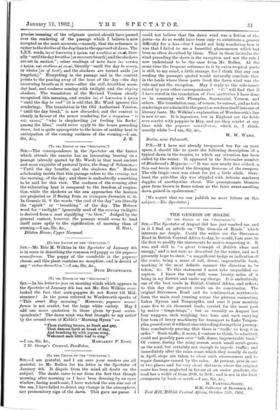[To THE EDITOR OF THE "SPECTATOR."] SIR,—The correspondence in the
Spectator on the breeze which attends the sunrise has an interesting bearing on a passage (already quoted by Mr. Ward) in that most ancient and most exquisite of pastoral lyrics, the Song of Solomon,— " Until the day breathe, and the shadows flee." Modern scholarship insists that this passage refers to the evening, not the morning, of the day ; and there is undoubtedly something to be said for this view. The coolness of the evening after the exhausting heat is compared to the freedom of respira- tion, while the shadows as the sun approaches the horizon are projected as if fleeing from us (compare Jeremiah vi. 4). In Genesis iii. 8 the words "the cool of the day" are literally the " spirit" or " breathing" of the day. The Hebrew word for " twilight " (generally used of the evening twilight) is derived from a root signifying "to blow." Judged by the general context, however, the passage would seem to lend itself more aptly to the signification of morning than of
evening.—I am, Sir, &c., H. HILL. Dilston House, Upper Norwood.






































 Previous page
Previous page